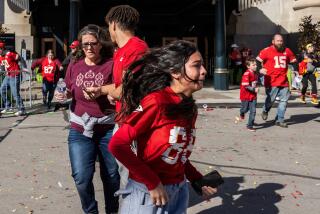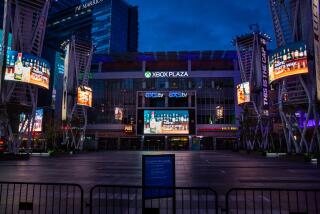‘Dark Knight Rises’ shooting: Six film critics respond
- Share via
The tragic shooting at a midnight screening of “The Dark Knight Rises” in Aurora, Colo., on Friday reignited discussions about the consequences of on-screen violence in contemporary culture. Does the prevalence of violent imagery in movies, video games and on television promote violence in the real world? Should freedom of artistic expression be respected above all else? In recent days, a number of prominent film critics have addressed these questions.
The Los Angeles Times’ Kenneth Turan writes that “it is impossible to be surrounded by the 21st century’s blood-soaked cinematic culture and not wonder what effect it’s having on us.” The proper response, Turan says, is not to point fingers but to take and share responsibility: “This problem is so big and so pervasive that everyone, including the movie business, has to shoulder a part of the blame if there is to be even a hope of getting it under control.”
He adds, “If we do have to have violence in popular culture, we have to stop pretending there are no consequences to having it be so easily available. More specifically, we have to stop our ratings system from being criminally lenient in how it treats disturbing material on-screen, especially where major studio films are concerned.”
PHOTOS: Scene of the shooting | Hollywood reacts
In the New Yorker, Anthony Lane writes that, although the notion of a masked gunman terrorizing innocent people has distressing on-screen parallels, movies themselves are not to blame for the shooter’s actions: “We have been here before, many times; once, very specifically, when John Hinckley, Jr., became fixated on ‘Taxi Driver,’ which came out five years before Hinckley attempted to assassinate Ronald Reagan. What holds true then remains the case today: no film makes you kill.”
In an op-ed for the New York Times, Roger Ebert echoes Lane, writing, “I’m not sure there is an easy link between movies and gun violence. I think the link is between the violence and the publicity.” He adds, “I don’t know if James Holmes cared deeply about Batman. I suspect he cared deeply about seeing himself on the news.”
Slate’s Dana Stevens says of such sentiments, “They’re right, of course.” But Stevens also admits, “I can’t stop asking … why there? I can’t get away from the fact that this act of violence took place — with, from the look of it, considerable advance planning — at an opening-night midnight showing of ‘The Dark Knight Rises,’ a movie that (like the rest of the trilogy it concludes) envisions modernity as a lawless dystopia where just such a thing might happen.”
Salon’s Andrew O’Hehir asks, “Does Batman, broadly speaking, have blood on his hands for what happened in Aurora?” His reply: “I’m a film critic and a hardcore civil libertarian who has spent much of my career defending free expression even in its nastiest and most disturbing forms. I do not believe that symbolic or fictional violence leads to real violence in any direct or causative manner …. So it may surprise you to learn that I think the question is a legitimate one and that, considered properly, it lacks a clear yes-or-no answer.”
And in the Guardian, Peter Bradshaw concedes, “Violence is a part of life, and the movies are entitled to reflect it and address it.” But, he adds, “by the same token, the movies are a part of life, and society is entitled to regulate them – and so it does. The killings in Colorado on Friday are a heartrending tragedy, and for me the debate must always come down on the issue of gun control.” Bradshaw concludes, “This issue is not just about the movies.”
RELATED:
The Big Picture: A message too ‘Dark’ for all?
Christopher Nolan: ‘The movie theater is my home’
‘Dark Knight Rises’ opens to estimated $160 million amid tragedy
MORE ON ‘DARK KNIGHT RISES’ SHOOTING
PHOTOS: Colorado movie theater shooting
PHOTOS: Hollywood reacts to shooting
‘Dark Knight Rises’ shootings have eerie overtones
More to Read
Only good movies
Get the Indie Focus newsletter, Mark Olsen's weekly guide to the world of cinema.
You may occasionally receive promotional content from the Los Angeles Times.










